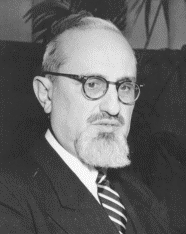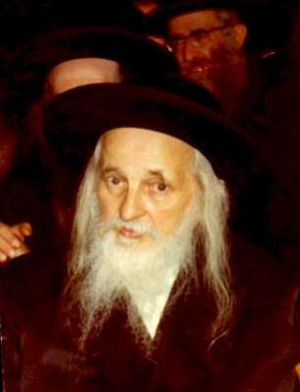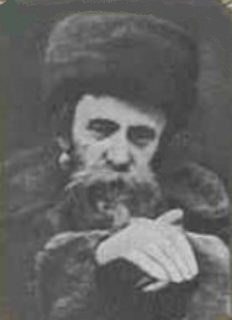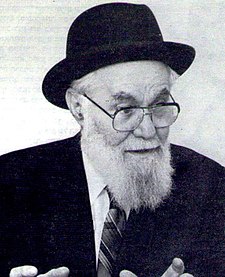
A rabbi is a spiritual leader or religious teacher in Judaism. One becomes a rabbi by being ordained by another rabbi—known as semikha—following a course of study of Jewish history and texts such as the Talmud. The basic form of the rabbi developed in the Pharisaic and Talmudic eras, when learned teachers assembled to codify Judaism's written and oral laws. The title "rabbi" was first used in the first century CE. In more recent centuries, the duties of a rabbi became increasingly influenced by the duties of the Protestant Christian minister, hence the title "pulpit rabbis", and in 19th-century Germany and the United States rabbinic activities including sermons, pastoral counseling, and representing the community to the outside, all increased in importance.

Joseph Ber Soloveitchik was a major American Orthodox rabbi, Talmudist, and modern Jewish philosopher. He was a scion of the Lithuanian Jewish Soloveitchik rabbinic dynasty.

A Rebbe or Admor is the spiritual leader in the Hasidic movement, and the personalities of its dynasties. The titles of Rebbe and Admor, which used to be a general honorific even before the beginning of the movement, became, over time, almost exclusively identified with its Tzadikim.
Religious pluralism is a set of religious world views that hold that one's religion is not the sole and exclusive source of truth, and thus recognizes that some level of truth and value exists in other religions. As such, religious pluralism goes beyond religious tolerance, which is the condition of peaceful existence between adherents of different religions or religious denominations.

Joel Teitelbaum was the founder and first Grand Rebbe of the Satmar dynasty.

Satmar is a group in Hasidic Judaism founded in 1905 by Grand Rebbe Joel Teitelbaum (1887–1979), in the city of Szatmárnémeti, Hungary. The group is a branch of the Sighet Hasidic dynasty. Following World War II, it was re-established in New York and has since grown to become one of the largest Hasidic dynasties in the world, comprising around 26,000 households.
The Three Weeks or Bein ha-Metzarim is a period of mourning commemorating the destruction of the first and second Jewish Temples. The Three Weeks start on the seventeenth day of the Jewish month of Tammuz—the fast of the Seventeenth of Tammuz—and end on the ninth day of the Jewish month of Av—the fast of Tisha B'Av, which occurs exactly three weeks later. Both of these fasts commemorate events surrounding the destruction of the Jewish Temples and the subsequent exile of the Jews from the land of Israel. According to conventional chronology, the siege of Jerusalem by Nebuchadnezzar II occurred in 586/7 BCE, and the second siege of Jerusalem (70) by the Romans, in 70 CE. Jewish chronology, however, traditionally places the first destruction at about 421 BCE: see Missing years for more information.

Tashlikh or Tashlich is a customary Jewish atonement ritual performed during the High Holy Days on Rosh Hashanah. In some Judaeo-Spanish-speaking communities the practice is referred to as sakudirse las faldas or simply as faldas.

Yeshiva Torah Vodaas is a yeshiva in the Flatbush neighborhood of Brooklyn, New York.

Aharon Rokeach was the fourth Rebbe of the Belz Hasidic dynasty. He led the movement from 1926 until he died in 1957.

Avigdor HaKohen Miller was an American Haredi rabbi, author, and lecturer.

Soltvadkert, formerly known as Vadkert, is a town in Bács-Kiskun County in Hungary with approximately 8,000 inhabitants. It is surrounded by several areas of Kiskunság National Park and Lake Vadkert.

Shmuel Auerbach was a Haredi rabbi in Jerusalem. He was considered a leader in the non-Hasidic Haredi community in Israel. His followers formed a political organisation known as the Jerusalem Faction. In 2013, as the Israeli government launched a campaign to draft Ultra Orthodox men into the IDF, the organisation adopted a controversial policy of demonstrations and incitement against the draft.

Torah Ore is an American Orthodox post-high-school yeshiva and kollel located in the northern Jerusalem neighborhood of Kiryat Mattersdorf. It was founded in 1960 in Bensonhurst, Brooklyn, New York, by Rabbi Chaim Pinchas Scheinberg. The yeshiva moved to Jerusalem in 1965 and entered its present location in 1971. As of 2013, Torah Ore enrolls approximately 300 undergraduate students and 600 kollel (married) students. It has thousands of alumni, many of whom became prominent rabbis, rosh yeshivas, and lay leaders of Jewish communities around the globe. Scheinberg served as rosh yeshiva of Torah Ore for over 50 years until his death in 2012; he was succeeded by his son, Rabbi Simcha Scheinberg.

Har HaMenuchot is the largest cemetery in Jerusalem. The hilltop burial ground lies at the western edge of the city adjacent to the neighborhood of Givat Shaul, with commanding views of Mevaseret Zion to the north, Motza to the west, and Har Nof to the south. Opened in 1951 on 300 dunams of land, it has continually expanded into new sections on the northern and western slopes of the hill. As of 2008, the cemetery encompasses 580 dunams in which over 150,000 people are buried.

The Chief Rabbinate of Israel is recognized by law as the supreme rabbinic authority for Judaism in Israel. The Chief Rabbinate Council assists the two Chief Rabbis, who alternate in its presidency. It has legal and administrative authority to organize religious arrangements for Israeli Jews. It also responds to halakhic questions submitted by Jewish public bodies in the Diaspora. The Council sets, guides, and supervises agencies within its authority.

Chanoch Dov Padwa was a rabbinic leader, Orthodox Jewish posek and Talmudist.
In Judaism, a person who is shomer Shabbat or shomer Shabbos is a person who observes the mitzvot (commandments) associated with Judaism's Shabbat, or Sabbath, which begins at dusk on Friday and ends after sunset on Saturday.

Zvi Yisrael Thau is an Orthodox rabbi, a disciple of Rabbi Zvi Yehuda Kook, and co-founder and president of Yeshivat Har Hamor in Jerusalem.

Rabbi Pinchas Mordechai Teitz (1908–1995) was a rabbi, teacher, author, and innovator in creating a modern Torah community in Elizabeth, New Jersey. He excelled in his family's tradition of caring for Jews across the globe in any challenges they faced. A mikvah he built in 1938, a day school he founded in 1941 that grew to more than 900 students, adult education courses that he initiated, the welcome he gave to displaced persons after WWII and to Jews who came from Russia, all became a model for other leaders to implement in their cities and towns.

















